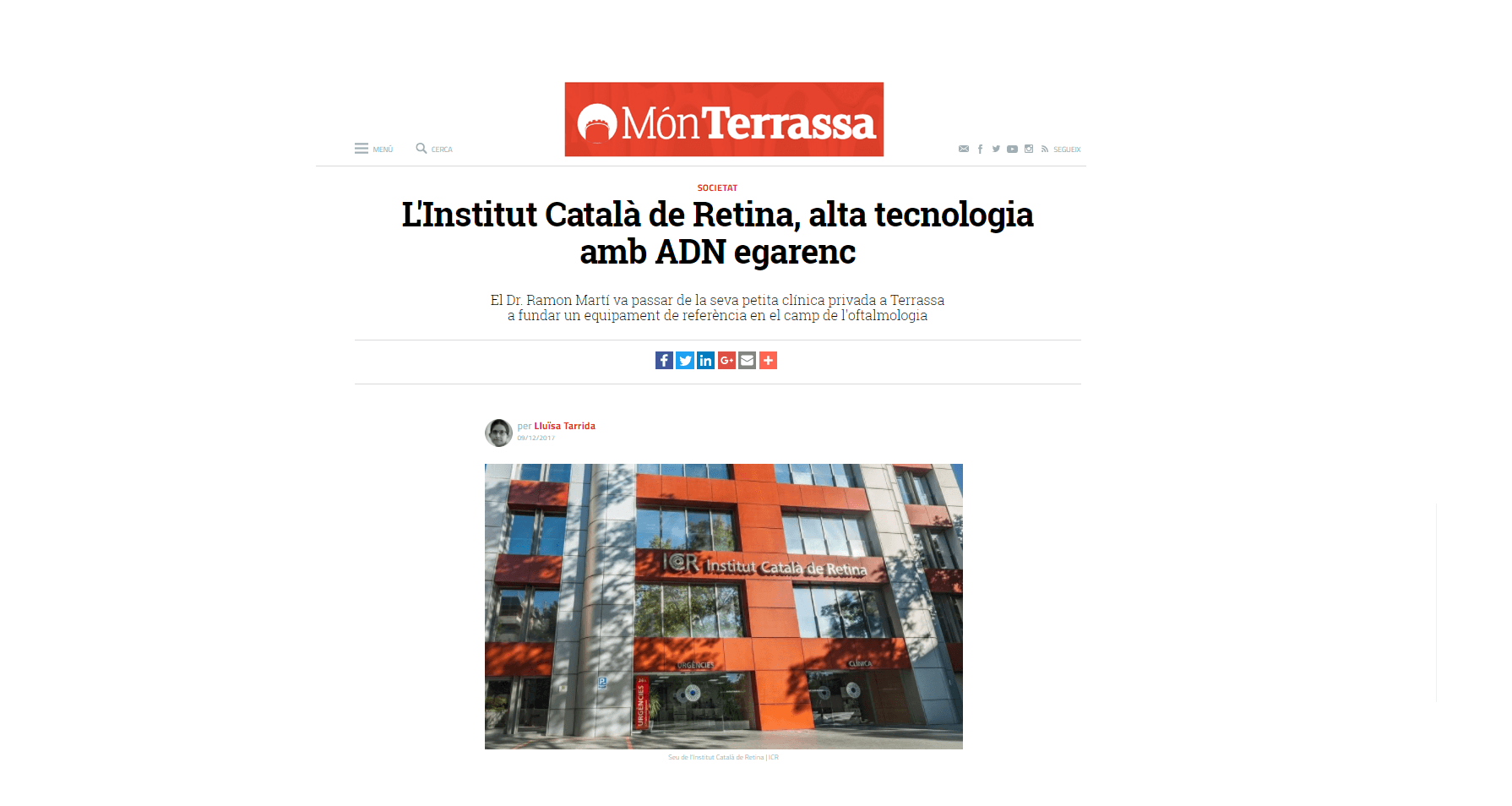
The newspaper “Món Terrassa” has published an interview with Mireia Escudé, CEO of ICR, which highlights that ICR has become one of the top ophthalmology centres in the country.
Click on the link below to read the full interview that we quote from below:
Institut Català de Retina, cutting edge technology with Terrassa DNA
Dr. Ramon Martí made the leap from a small private clinic in Terrassa to founding a centre of excellence in the field of ophthalmology.
The ICR has become one of the top ophthalmology centres in our country. What many are unaware of is that its founder, Dr. Ramon Martí i Bonet, is from Terrassa. Over the years the centre has invested heavily in innovation and research, both in the fields of surgery and diagnostics. Mireia Escudé, CEO of the ICR, spoke to Món Terrassa about how the Insitut has grown and its plans for the future.
Where, when and how was ICR founded? Why was Terrassa chosen? The Institut Català de Retina began in Terrassa, where Dr. Ramon Martí began his private practice in 1976. Later, the ICR was created in Barcelona and then in 1986 the Terrassa branch was opened, to take on the patients that Dr. Martí had treated in Terrassa. The clinic is housed in the iconic Círculo Egarenc, although it will soon move to a modernist building in the city. Dr. Mercè Martí, head of the centre’s Refractive Surgery Department, will continue to manage the new centre.
What was your objective at the beginning?
From the beginning, the ICR was born with the objective of becoming a national centre of excellence within the field of ophthalmology, offering the best specialists and the best technology. From this initial concept we now offer the latest technology to operate on patients with guarantees for success and have a team of over 350 professionals including 90 ophthalmologists. This means that we have a capacity that few centres in the country can match.
Has the initial objective changed with time?
The desire to be a centre of excellence hasn’t changed at all, but in recent years ICR has started to project internationally in different countries. On the other hand, we have also taken major steps towards consolidating the research department and the teaching project by incorporating new medical-surgical masters programmes in ophthalmology and collaborating with the Faculty of Medicine of the International University of Catalonia.
The ICR has its headquarters in Barcelona but it’s kept a branch in Terrassa. Why?
This was due to our business model and links to the city. As I explained before, Dr. Ramon Martí, the founder and president of ICR, began his private practice in Terrassa, his city of birth. Then the ICR project began in Barcelona and a branch was opened in Terrassa. The objective was to have another centre in a major city in the country and that was the capital of a district. Given the emotional attachments for the founder, it wasn’t a difficult choice.
Which services are offered in Terrassa? Which types of treatment do patients need to go to Barcelona for?
The branch at Terrassa has departments for general ophthalmology, cataracts, refractive surgery, glaucoma, paediatric ophthalmology, retina and vitreous and contact lenses. Therefore, it is a complete ophthalmology centre with very specialised departments in which additional tests can be carried out for treatment or to diagnose illnesses. In the case of surgery, patients are sent to Barcelona where ICR has operating rooms exclusively for ophthalmology, with the most advanced technology to guarantee the best treatment.

Latest generation technology in ophthalmology | ICR
Why is technology important in the field of ophthalmology?
Professionalism and technology are the best combination for achieving the best solution for the patient. Our passion for your wellbeing means that we incorporate the latest innovations that can be of help to our patients, provided there is strong scientific evidence to back it up. Our team of professionals, with a high level of demand and excellence, also has the most advanced technology on the market, both in terms of diagnostic tests and the surgical and therapeutic procedures. This enables us to enter into the most precise details about diagnosis and treatment that the patient should follow.
We have invested heavily in non-invasive surgery; a concept that is essential for us and that simplifies the patient’s recovery. The final objective, as has been said, is always their wellbeing and this goal has helped us to become a centre of excellence for the companies that develop technology for the ophthalmology sector. The analytical processes, tests and the results produced by the ICR are very highly regarded and can mean better diagnosis, treatment and solutions for our patients.
Contact us or request an appointment with our medical team.